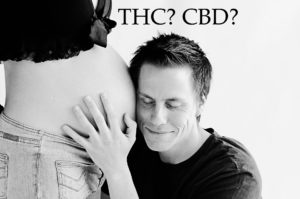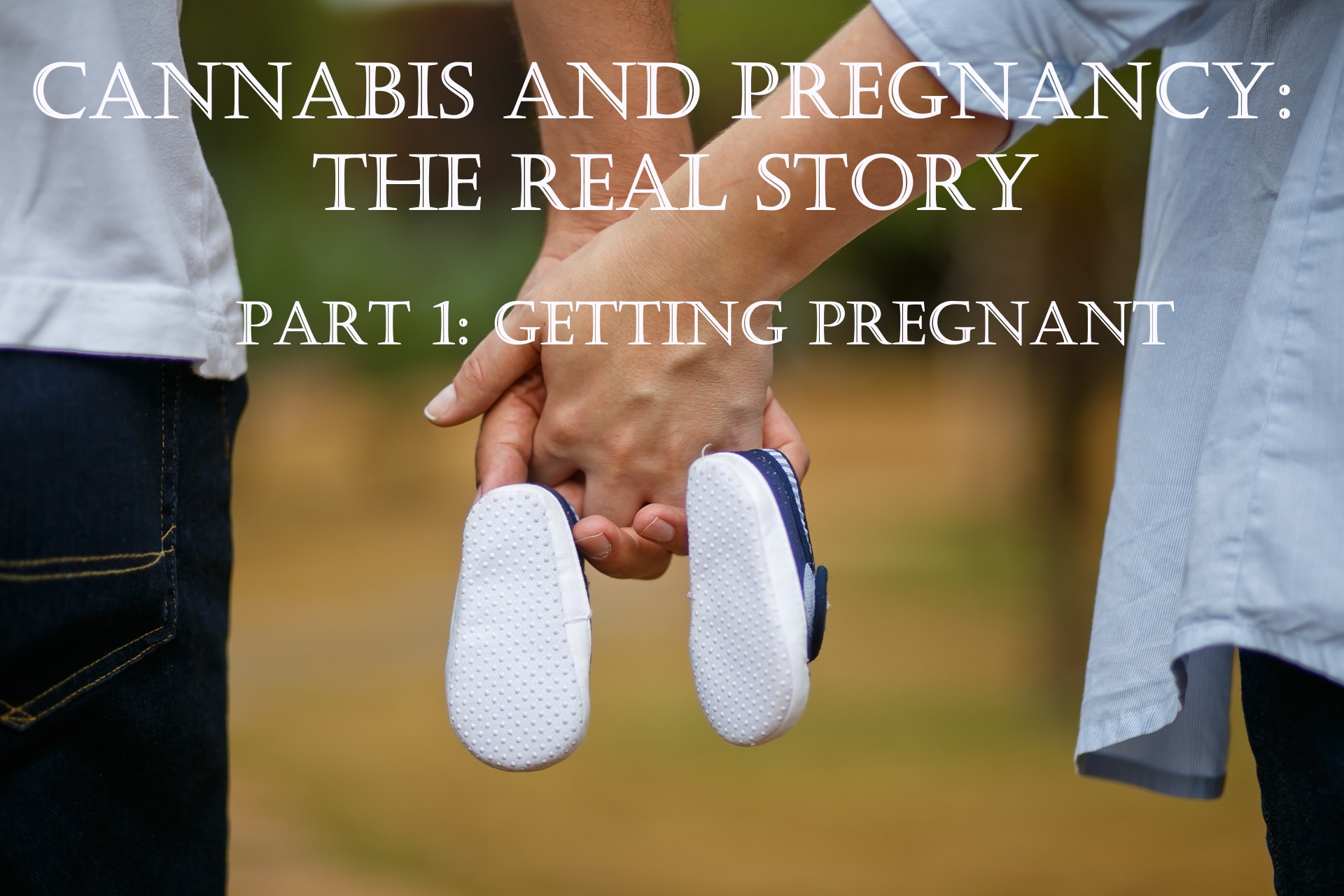Cannabis and pregnancy: Will smoking cannabis affect your chances of getting pregnant? Is it true that CBD is harmless? And what men should know about THC and fertility
Many articles looking at fertility, discuss the problems of using cannabis before and during pregnancy. Most of them are wrong… Are you Smoking cannabis while trying to get pregnant? Read below about cannabis and pregnancy to learn more about the problems associated with trying to get pregnant while using cannabis.
Cannabis and pregnancy: Fertility
Fertility cannot occur without normal sperm & ovum, as well as a functioning hypothalamus & anterior pituitary.
Much has been written in the scientific literature about the effects of cannabis on fertility. Unfortunately, some of the studies that “prove” that cannabis is associated with a decreased number of healthy pregnancies have been unreliable because the people who were studied were also smoking nicotine cigarettes at the time. Because smoking cigarettes has already been shown to decrease fertility and have a negative impact on the health of the unborn child, automatically concluding that cannabis is the culprit when the study subject is also a known nicotine cigarette smoker makes no sense.

Cannabis and pregnancy: What men should know about THC and fertility?
Most of the studies of cannabis and its influence on fecundity were performed on THC and not CBD. However, since the researchers also measured the effects of anandamide in these same studies, and CBD inhibits the breakdown of anandamide, the results of the conducted research can be attributed to the effects of both THC and CBD.
Cannabinoids and Male Reproduction
Cannabis use can decrease the number of sperm produced by the testis and decrease the motility of the sperm when it matures in the epididymis. The result is fewer sperm in the ejaculate capable of merging with the ovum to produce a fertilized egg.
However, the sequela of cannabis use is reversible. The amount of time it takes for the effects of cannabis to dissipate is directly proportional to the frequency of cannabis use.
If cannabis is used three times a week or less, after three days the sperm production will revert to normal. If cannabis is used four times a week, it will take 5-7 days. If cannabis is used daily, is will take 10-15 days. If cannabis is used multiple times a day, it will take 1-2 months.
Even though the amount and motility of the sperm during cannabis use is less, the components of the sperm are completely normal. Therefore, normal pregnancies absolutely occur even during active cannabis use.
Cannabinoids and Female Reproduction
During the luteal phase, there is a surge in LH which allows ovulation to occur. Cannabis suppresses ovulation by suppressing LH (luteinizing hormone) secretion during the luteal phase.
In addition, cannabis can interfere with successful implantation of the fertilized egg into the uterine lining.
As observed in the male, the effects of cannabis on female fertility are entirely reversible with cessation of cannabis use. In addition, one should remember that normal pregnancies occur during active cannabis use.
Cannabinoids and Stress

Cannabis and Pregnancy: Reducing stress is important
Stress causes a reduction in LH release, and as a consequence of this, there is a decrease in sperm and ovum production as well as a decrease in successful implantation of the fertilized egg in the uterine lining.
Because cannabis is an excellent anxiolytic, it can reduce the negative effects stress has on the reproductive cycle. By reducing stress, cannabis may therefore improve fertility.
Cannabis and Pregnancy: Studies
A prospective cohort study was performed on 1125 couples. The results were published in the Journal of Epidemiology and Community Health in March 2018. The participants completed a questionnaire about their lifestyle habits including the use of THC and their frequency of sexual intercourse. The couples were followed for up to one year. Though active cannabis users were found to be somewhat less fertile, the number of successful pregnancies in people who used cannabis was the same as in nonusers of cannabis. When these unexpected results were further analyzed the researches realized that the reason users of cannabis experienced the same number of successful pregnancies as nonusers – despite the decreased fertility caused by cannabis – was due to the unexpected increase in the number of sexual encounters in the cannabis users as compared to the nonusers.
These results exposed the myth that THC decreases the frequency of sexual intercourse. A proposed reason for these findings was due to the anxiolytic effects of cannabis. When anxiety is reduced, there is greater emotional comfort with oneself and one’s partner and intimacy is more likely to occur.
Cannabis and pregnancy: Take home points
- THC and CBD decrease fertility by decreasing sperm production & motility in the male, and ovum production, ovulation, and successful implantation of the fertilized egg in the female. However, THC and CBD also decrease cortisol release which results in decreased stress, and consequently improved gonadal health and function as well as an increase in the frequency of sexual encounters.
- THC is psychoactive, and CBD is not. Both are non-addictive and have no toxicity.
- After all reviewed studies are taken into account, including the bench science, amphibian studies, mammalian studies, human studies, and literature reviews, and with a critical eye on research using flawed data – such as including nicotine cigarette smokers together with cannabis smokers, the conclusion is as follows: Neither THC nor CBD has any meaningful negative effect on fertility in the man or woman.
Read next: Are There Any Risks Of Using Cannabis In Pregnancy?
References:
“Maternal Marijuana Use and Adverse Neonatal Outcomes: A Systematic Review and Meta-analysis.” Obstet Gynecol. 2016 Oct;128(4):713-23.
“The central cannabinoid receptor inactivation suppresses endocrine reproductive functions.” Biochem. Biophys. Res. Commun. 2001;284:363–368.
“Inhibition of luteinizing hormone secretion by delta9-tetrahydrocannabinol in the ovariectomized rat: effect of pretreatment with neurotransmitter or neuropeptide receptor antagonists.” Steroids. 1999;64:664–671.
“Marijuana smoking suppresses luteinizing hormone in women.” J. Pharmacol. Exp. Ther. 1986;237:862–866.
“Proceedings : effect of Δ9-tetrahydrocannabinol on the hypothalamic-pituitary-gonadal system in the maturing male rat.” J. Endocrinol. 1976;68:43–44.
“Alcohol inhibits luteinizing hormone-releasing hormone release by activating the endocannabinoid system.” Proc. Natl. Acad. Sci. USA. 2004;101:3264–3268.
“Effects of cannabinoids on prolactin and gonadotropin secretion: involvement of changes in hypothalamic gamma-aminobutyric acid (GABA) inputs.” Biochem. Pharmacol. 1998;56:1331–1338.
“Evolutionary aspects of cellular comunication in the vertebrate hypothalamo-hypophysio-gonadal axis.” Int. Rev. Cytol. 2002;218:69–141.
“Delta-9-tetrahydrocannabinol stimulates receptive and proceptive sexual behaviors in female hamsters.” Pharmacol. Biochem. Behav. 1981;14:745–747.
“Reproductive functions of corticotropin-releasing hormone. Research and potential clinical utility of antalarmins (CRH receptor type 1 antagonists).” Am. J. Reprod. Immunol. 2004;51:269–274.
“A suppression of gonadotropin secretion by cortisol in castrated male reshus monkeys (Macaca mulatta) mediated by the interruption of hypothalamic gonadotropin-relesasing hormone release.” Biol. Reprod. 1985;33:423–431.
“Adaptations in endocannabinoid signalling in response to repeated homotypic stress: a novel mechanism for stress habituation.” Eur. J. Neurosci. 2008;27:2821–2829.
“Endocannabinoid signalling negatively modulates stress-induced activation of the hypothalamic-pituitary-adrenal axis.” Endocrinology. 2004;145:5431–5438.
“Endocrine effects of marijuana in the male: preclinical studies.” NIDA Res. Monogr. 1984;44:46–64.
“Cannabinoids in male mice: effects on fertility and spermatogenesis.” Science. 1982;216:315–316.
“Endocrine effects of marijuana in the male: preclinical studies.” NIDA Res. Monogr. 1984;44:46–64
“Sperm transport in the female reproductive tract.” Hum. Reprod. Update. 2006;12:23–37
“A gradient of 2-arachidonoylglycerol regulates mouse epididymal sperm cell start-up.” Biol. Reprod. 2010;82:451–458.
“Effects of delta-9-tetrahydrocannabinol, the primary psychoactive cannabinoid in marijuana, on human sperm function in vitro.” Fertil. Steril. 2006;85:653–660.
“Genetic loss of FAAH compromises male fertility in mice.” Biol. Reprod. 2009;80:235–242.
“Marijuana smoking suppresses luteinizing hormone in women.” J. Pharmacol. Exp. Ther. 1986;237:862–866.
“Recreational drug use and the risk of primary infertility.” Epidemiology. 1990;1:195–200.
“Jekyll and Hyde: two faces of cannabinoid signaling in male and female fertility.” Endocr. Rev. 2006;27:427–448.
“Fluctuation in anandamide levels from ovulation to early pregnancy in in-vitro fertilization-embryo transfer women, and its hormonal regulation.” Hum. Reprod. 2009;24:1989–1998.
“Endocannabinoid system in first trimester placenta: low FAAH and high CB1 expression characterize spontaneous miscarriage. Placenta. 2009;30:516–522.
“Effects of psychoactive and nonpsychoactive cannabinoids on the hypothalamic-pituitary axis of the adult male rat.” Pharmacol Biochem Behav 1990; 37(2): 299-302.
“Review and update: marijuana and reproduction.” Acta Ginecol (Madr). 1985 Aug-Sep;42(7):420-9.
“Marijuana use and fecundability in a North American preconception cohort study.” Journal of Epidemiology and Community Health (1978), December 2017
“Birth outcomes associated with cannabis use before and during pregnancy.” Pediatric Res 71: 215-219, December 21, 2011
“Prenatal exposure to cannabis and maternal and child health outcomes: a systematic review and meta-analysis.” BMJ Open 2016;6
“Maternal Marijuana Use and Adverse Neonatal Outcomes: A Systematic Review and Meta-analysis.” Obstet Gynecol. 2016 Oct;128(4):713-23.
“Marijuana use and fecundability in a North American preconception cohort study.” J Epidemiol Community Health. 2018 Mar;72(3):208-215
“Cannabinoids and Reproduction: A Lasting and Intriguing History.” Pharmaceuticals (Basel). 2010 Oct; 3(10): 3275–3323.









